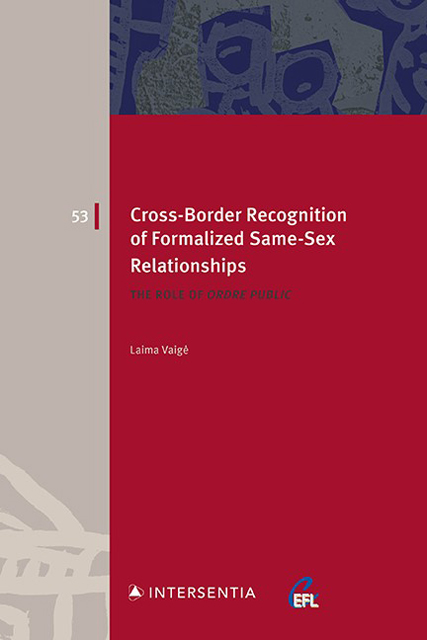Book contents
- Frontmatter
- Preface
- Contents
- List of Abbreviations
- Special Terminology
- List of Legislation and Other Instruments
- List of Cases
- Part I Setting the Stage
- Part II The Ordre Public in the Baltic States and Poland
- Part III The European and the EU Ordre Public
- Part IV Legal Effects of Formalized Same-Sex Relationships: National and Supranational Law
- Part V Law in Context
- Bibliography
- Index
- About the Author
- European Family Law Series
Chapter 13 - Protection against and Re-Cognition of “Foreign” Realities
Published online by Cambridge University Press: 20 April 2023
- Frontmatter
- Preface
- Contents
- List of Abbreviations
- Special Terminology
- List of Legislation and Other Instruments
- List of Cases
- Part I Setting the Stage
- Part II The Ordre Public in the Baltic States and Poland
- Part III The European and the EU Ordre Public
- Part IV Legal Effects of Formalized Same-Sex Relationships: National and Supranational Law
- Part V Law in Context
- Bibliography
- Index
- About the Author
- European Family Law Series
Summary
Introduction
Realities of Human Beings: Whose Sensitivity?
Chapter 12 presented an insight into the realities of the respective State identities and the cultural context in the Baltic States and Poland. The societies have experienced deep cultural traumas and geopolitical insecurity. Although these traumas are not related to LGBT rights, the sense of threat is transferred, as a defence mechanism, onto LGBT rights. Cross-border recognition of civil status in the States which are not ready for same-sex marriages is often described as “very sensitive”, but seldomly is it the sensitivity of people that is meant by the words “a sensitive issue”. Political sensitivity is the constant focus of attention. In the current chapter, by contrast, the realities of human beings are at the centre of attention. There seems to be a hidden question emerging in many contexts whether the same-sex spouses are indeed vulnerable and sensitive humans, or political activists, and whether their marriage is a political project, or indeed serves the same function as a heterosexual marriage. That is why it is so significant to consider the humanity of people at stake.
Concept of Re-Cognition
The concept of “recognition” in this particular chapter is also broader than in other parts of the book. It is recognition in law and beyond law, rather than “cross-border recognition of validity of status” that becomes the centre of attention. To mark this difference, this chapter uses a slightly different word: “re-cognition”. The word “recognition” in itself contains “cognition”, which refers to mental development and understanding. The Latin word cognosco ( con “with” and gnōscō “know” ) means, in the process of cognition, we become aware, acknowledge, perceive and understand. Therefore, the process of recognition is closely related to understanding the “others”. Empirical research in psychology and sociology greatly contributed to the understanding of same-sex families and contributed to legal changes.
- Type
- Chapter
- Information
- Cross-Border Recognition of Formalized Same-Sex RelationshipsThe Role of <i>Ordre Public</i>, pp. 407 - 424Publisher: IntersentiaPrint publication year: 2022



